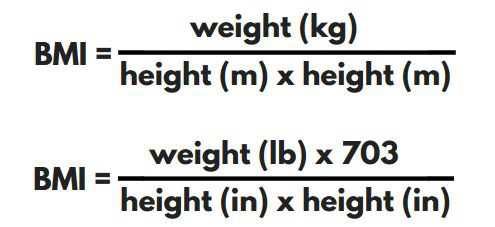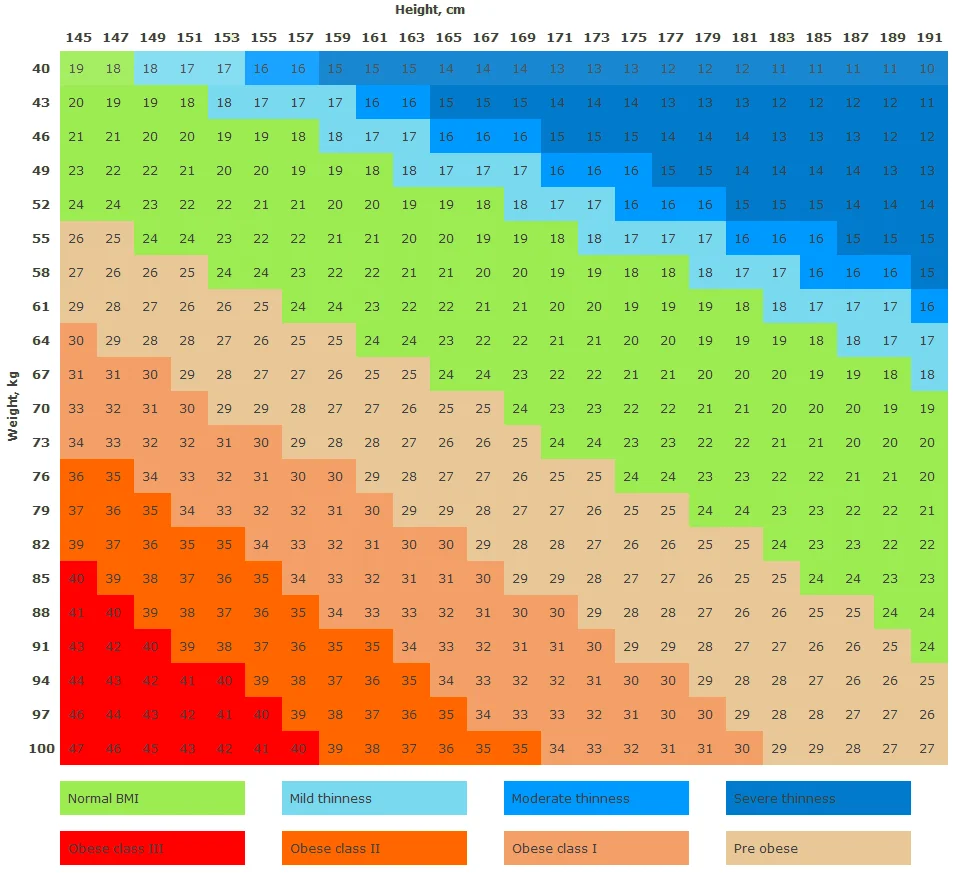Page Contents
These days, it’s no longer enough just to be super skinny to look good. Nowadays, you need to have the right weight-to-height ratio to be considered handsome, sexy, and attractive. And this is where knowing and improving your BMI comes in.

In this article, we’ll talk about BMI, how to calculate it, maintain it, and it’s limitations.
What Is BMI?
BMI is the short form of ‘Body Mass Index.’
It’s a tool used by doctors to screen for overweight and obese patients. You can calculate it yourself to get a better estimate of your body fat and health.
It also helps assess how much of a risk you have of certain diseases that are related to overweight/obese individuals.
Your Body Mass Index doesn’t directly measure your body fat but estimates it according to your weight, and height.
- Underweight
- Normal (Healthy Weight)
- Overweight
- Obese
Methods that provide more accurate measures of body fat including using densitometry, bioelectrical impedance, or dual energy x-ray absorptiometry (DXA).
Why Should You Check Your BMI?
It’s important to check your BMI periodically. The reason it’s one of the first calculations a doctor does is that it’s inexpensive and easy to calculate.

You can assess your level of body fat with this simple measure too.
It also provides you with a risk level of potential health issues which can be caused due to obesity.
It also helps when tracking your workout and weight loss progress.
As you lose more weight, you are bound to lower your BMI. And in case you are trying to gain muscle, you will see a rise in the same.
How Is Body Mass Index Calculated?
There are three ways in which you can find out your BMI:
Use A BMI Calculator:
You can easily find a BMI Calculator online or by using a smartphone app.
I have also included a BMI calculator here if you want to use it to find out your BMI:
Manually Calculate The BMI Yourself:
You can also opt to calculate your BMI using this simple formula:

As you can see, you can use the metric or imperial version to get the same result.
The BMI will be:
BMI = 75 / (1.7 x 1.7)
BMI = 25.95
Now, let’s look at the imperial calculations:
The Body Mass Index will be:
BMI = (180 / (63 x 63)) x 703
BMI = 31.88
Use The BMI Chart:
You can also opt for a simple BMI Chart. This chart has a range of weights on one side while a range of heights on the other.

- Person A has a Body Mass Index of around 26 (25.95 using the formula)
- Person B has a Body Mass Index of around 32 (31.88 using the formula)
What Is The Right BMI For You?
After you have calculated your BMI, it’s not the end.
You still have to compare it to your ideal fitness range.
For normal adults, I found the BMI ranges to be:
| Category | BMI From | BMI To |
| Very Severely Underweight | 15 | |
| Severely Underweight | 15 | 16 |
| Underweight | 16 | 18.5 |
| Normal (Healthy Weight) | 18.5 | 25 |
| Overweight | 25 | 30 |
| Obese Class I (Moderately Obese) | 30 | 35 |
| Obese Class II (Severely Obese) | 35 | 40 |
| Obese Class III (Very Severely Obese) | 40 | 45 |
| Obese Class IV (Morbidly Obese) | 45 | 50 |
| Obese Class V (Super Obese) | 50 | 60 |
| Obese Class VI (Hyper Obese) | 60 |
How Should You Improve And Maintain Your BMI For The Better?
After evaluating the BMI category you fall into, you may realize that you have to increase or decrease your BMI.
And since we can modify our heights, we have to change our body weight.
Increasing Body Mass Index If You Are Underweight:
If you are underweight, you need to start with your diet.
Begin with adding healthy calories to your meal plans. These healthy choices include assorted nuts, fruit, whole grains, wheat, and cheese.
You should also eat nutrient-dense foods like brown rice, protein bars, meats, and eggs.
Also, don’t forget the healthy carbohydrates and proteins that will promote muscle gain and healthy weight gain.
If you are struggling with emotional issues with food, try to eat multiple smaller meals. This can make it easier to gain weight without feeling like you are bingeing.
Keep an eye on your workouts. If your exercise routine has more aerobic exercise than resistance training, you may be losing weight and BMI.
So, do less cardio and calorie burning exercises while doing more muscle gaining exercises.

Decreasing BMI If You Are Overweight/Obese:
The only way you are getting those BMI numbers down is by losing weight. And if you are obese, you are going to have to lose a lot of it.
The key here is to pick a challenging but achievable goal for weight loss. You can also choose to use weight loss supplements that aid in fat burn.
Another option I would recommend is strength training. If you can hit the gym and perform intense workouts, you are about to see faster fat burn.
Your diet should also be centered around low-fat foods with no sugar or processed foods. A diet rich in fiber and healthy carbohydrates is also a boost for effective weight loss.
You can also consider weight loss surgery. But I would only recommend this to those who have tried and failed with other options.

What Are The Limitations Of Body Mass Index?
While calculating your BMI is easy, it may not be the best measure of your health. Experts recommend using BMI as a guideline and not to rely heavily on it.
One of the biggest pitfalls of BMI is that it doesn’t take the gender or age into account. So, if you are 5’5”, you are expected to have the same BMI when you are 21 and 81.
Also, your Body Mass Index measure can’t tell you where your fat is situated.
It’s also inaccurate when it comes to those who have a lot of muscle and those who have very little.

What Do I Think About Body Mass Index And Its Use?
I think that measuring your BMI is a good indicator of your overall health and wellbeing.
And while it’s not the most accurate measure out there, it does provide a decent picture of your health.
It’s also most useful when trying to lose fat and weight. And if you want to find out if you are healthy, overweight or obese, you should calculate your BMI.